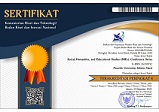The STEM Approach in Enhancing Mathematical Problem-Solving Abilities in Elementary School Students
Abstract
This research aims to describe the application of the STEM (Science, Technology, Engineering, and Mathematics) approach to mathematics learning in elementary schools, specifically in improving students' problem-solving abilities. This leads to a lack of space for students to develop higher-order thinking skills. This research uses the Systematic Literature Review (SLR) method, which involves gathering, reviewing, and analyzing various relevant literature on the application of the STEM approach in mathematics learning. The literature search process was conducted thru international and national databases such as Google Scholar, ERIC, ScienceDirect, and Garuda, obtained from 20 journals or articles published between 2018 and 2025. The results of this study indicate that the STEM approach is proven effective in integrating various disciplines, making learning more contextual and meaningful for students. Thru this approach, students not only learn mathematical concepts theoretically but are also able to connect them to real-life situations around them. Thus, implementing the STEM approach in elementary school mathematics learning can be a potential strategy for developing higher-order thinking skills, particularly students' problem-solving abilities.
Keywords
Full Text:
PDFRefbacks
- There are currently no refbacks.





